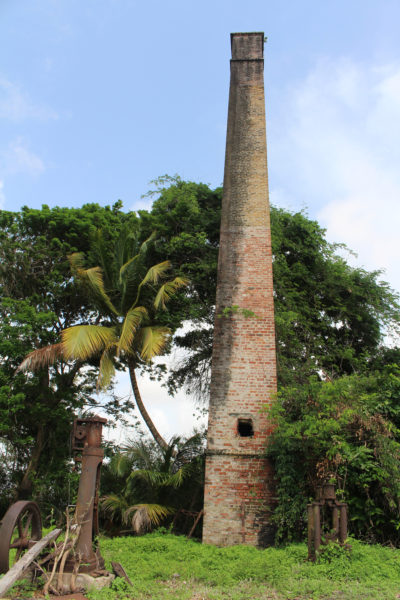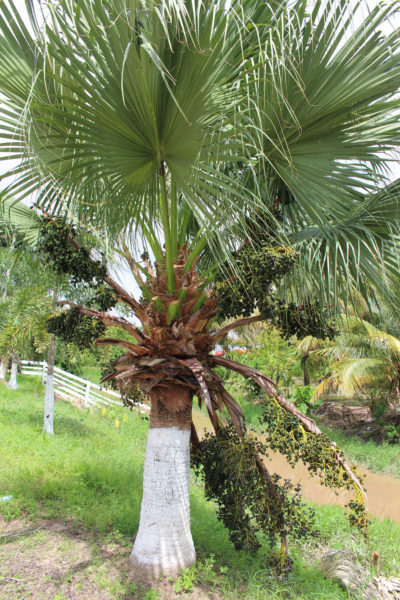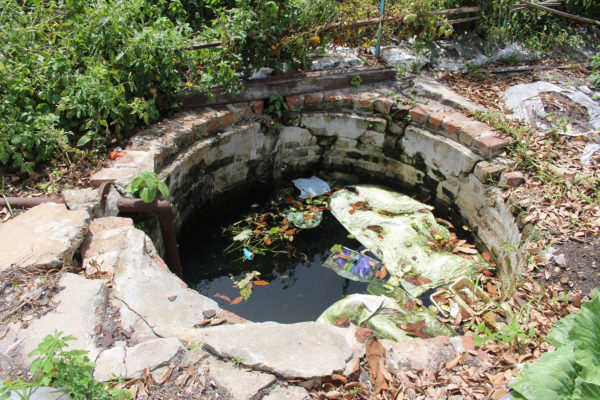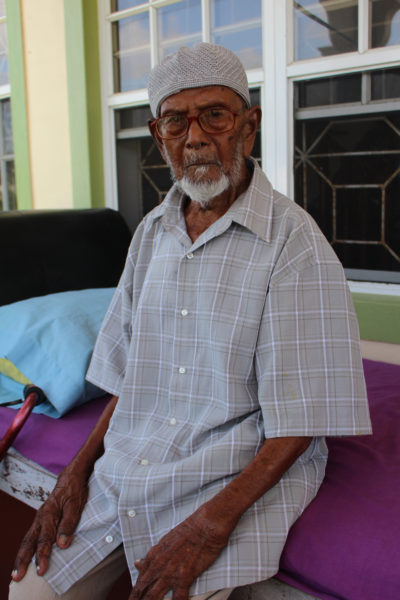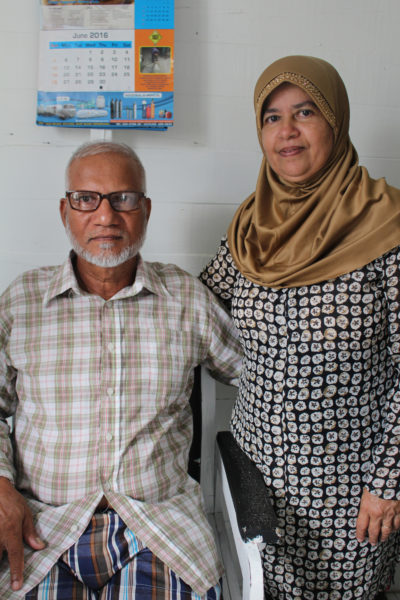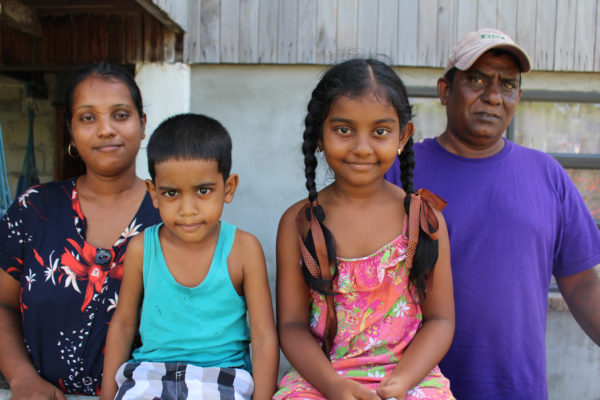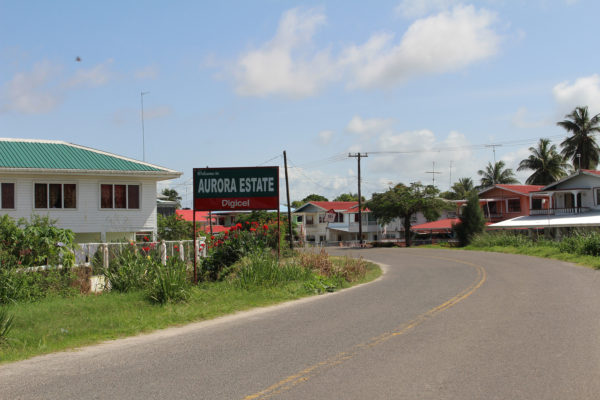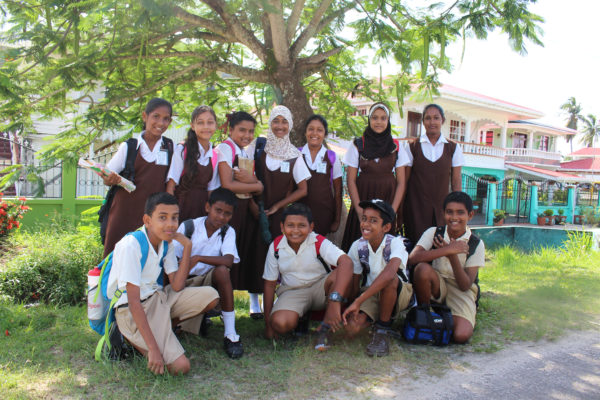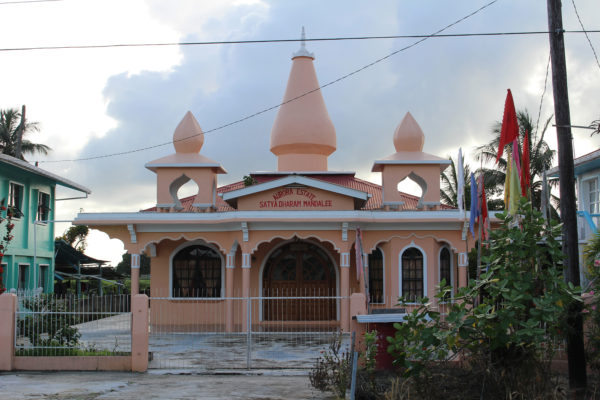Story and photos by Joanna Dhanraj
Aurora on the Essequibo Coast is divided two sections: Aurora Estate and Aurora Village.
Although residents say the area was once owned by the Dutch, the name Aurora is of Latin origin meaning dawn.
On entering Aurora Estate the first thing one might see is a towering ‘Dutch’ chimney scaling above the surrounding trees. Along the street leading to the chimney are beautiful palm trees loaded with fruits.
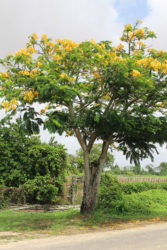
The man who now owns the land with the chimney said his grandfather was the one who bought the land.
Further on, Padmini Ally lives with her husband and two children. Five years ago she and her family moved to Aurora Estate from Wakenaam. Life in Wakenaam, she said, was just the same except for having more amenities available to her in Aurora.
“I don’t have a problem with anybody. Since I come here, I find the people quiet and friendly,” the woman said.
Most persons, she said, work with the rice mill or on farms. Others have their own small businesses; and some work in Buck Hall at Barama Company Ltd.
Ally’s two children attend the nursery and primary schools in the Aurora Village. However the schools are currently being rebuilt. The buildings have been broken down and the children have been having lessons “under bottom houses” since last term, Ally said. School commences at 8.30 am and concludes at 2.30 pm. The extra half an hour in the morning, she believes, is to accommodate children coming from riverain areas.
According to Ali, everything is easily accessible here. She and many of the other villagers get their groceries from grocery vans.
Drainage is good as flooding only occurs once in a while. Ally wishes however for street lights since at night it is really dark.
She said the village is really lovely and although she would like to recommend that persons go there to live, it may not be possible since there isn’t space to accommodate them.
Close by, the World Beyond Georgetown found Ramjohn Mohamed Khan enjoying the afternoon breeze on his verandah with his walking stick close by. Ramjohn, at 103, is the oldest resident in Aurora Estate and is believed to be the oldest on the entire Essequibo Coast as well. Should he live to see August 16, he will celebrate his 104th birthday.
According to one of his sons visiting from Canada, his father can still shower himself, get dressed and he sees very well. However, he’s partially deaf and most of the questions had to be relayed through his son.
Khan said he fathered 12 children with two wives; one of the twelve is now deceased.
In the mornings he has his pressure tested, eats his breakfast, cleans up and takes his medication. He goes outside to enjoy the fresh air every now and again. According to the son, Khan owes his longevity to hard work and exercise. He said Khan once spoke fluent Hindi, Urdu, Arabic and English, but because of his age he no longer speaks much.
Asked how he felt about being 103, without hesitation, he replied, “Great!”
Mohamed Faruk Khan, another son of Khan and also a Justice of Peace and Commissioner of Oaths to Affidavit lives a few lots away. Though he was resting, he was eager to share what he could.
“My grandfather was among the last batch of indentured slaves who came to Guyana on the last boat from India in 1898. He came from Lahore, India,” Faruk Khan said.
His grandfather, he said, never intended to come to Guyana. He was never documented in India to come here. He had gone to bid farewell to his friends who were coming to Guyana, but somehow ended up on the ship with them.
Once he arrived here, he was documented here and was contracted to work on the Aurora Sugar Estate for five years before he could return to India. However, he never went back.
Khan’s grandfather eventually married and had three children, one being Ramjohn. His wife then died when the children were very young and Khan’s grandfather remarried a woman from Kitty, Georgetown. Khan said Ramjohn would have been around ten years old when his father died, leaving him and his siblings orphaned.
His stepmother returned to Kitty, taking them with her, and Ramjohn attended a school in Kitty, which was run by the late president Forbes Burnham’s father who was the headmaster. According to Khan, his father told them that the headmaster had told his stepmother that he was way ahead of his class and also the class a level above him and it would be better if she kept him home for a few months. So kept him home she did, but he never returned.
“He started working at the age of 12, helping to rear cows for a Chinese man in Kitty. A couple of months later he left to go work at the Sophia Sugar Estate to fertilize cane. He worked there for about three years then he came back to live at Three Friends here on the Essequibo Coast with his sister and brother-in-law. He spent two years there and then returned to Aurora Estate to work on the Sugar Estate where he worked under R. Pajay who was then the owner of the entire Aurora,” Khan said.
“Aurora was eventually sold to Harry Sahoye and for a period he worked under him. Sahoye, in time, rented land to the people in the area who wanted to plant rice. My father rented a piece of land and started to plant rice. He later bought it along with a small cottage. The cottage was considered to be a more updated building since was a bit off the ground and had a wooden floor; whereas, the logies were on the ground and had a mud floor. When he bought the house he was in his twenties and was the only young man in Aurora Estate at that time that had a house of his own. So, according to him, he was eyed by the girls in the village. He was 24 years old at the time.”
Ramjohn first married “Katie”; a union, which produced two daughters. His second marriage was to “Mabel,” who bore him seven sons and three daughters; a total of 12 children.
“My father was a very helpful and hardworking man. He was a deputy Imam and an Imam for the Aurora Village. He served in the capacity of over 50 years. My father was also one of the founders of the Aurora Cooperative Thrift and Credit Society registered number 381.
“In the co-op people would pool their money and lend to members at a small interest rate to farm rice. But as time went people wanted bigger loans and so they had to go to the banks and the co-op was [dissolved],” Khan said.
Speaking about himself, the JP said, “I’m a former member of the ninth parliament (2006-2011). I was also an RDC counsellor for 23 years. During my lifetime I cultivated rice and reared cattle. I also worked at the A Mazaharally and Sons Sawmill at Supenaam.
“Growing up as a boy, I could remember it had a few logies still in the village but the proprietor was renting house lots to people and eventually he sold them the lots.”
During this time, he said, the people lived like one big family. Crime he said, was foreign then, but it prevails now, though it’s mostly petty crime. The villagers of Aurora Estate, he said, still live close, though over the years the love has begun to fade.
“People years ago were all so poor that they were always checking on each other to see if they had something to eat. These days, people competing to be better than the other. If someone in those days didn’t have food, we shared. When this one sowing or reaping, we gone and help them then they return the help when it’s the other’s turn. Whoever left in the community would look after the children. Sometimes one lady kept watch over 10 – 12 children,” he said.
Khan said the sugar factory became a rice mill where farmers sold their rice and the village has gradually developed over the years.
“This is one of the few villages that doesn’t have a problem with the NDC. The drainage is reasonable,” he said. However, he said he would like to see the place kept tidier, “as in the road shoulders.”
He added, “The village is very quiet and the people are very friendly. People still keep watch over each other. We still live close. Almost everybody is family and I mean that literally; back then you could have only married within your village. I’m satisfied with all that Aurora has to offer.”
Aurora Estate he said has only a Mandir. The village has all the other amenities from which they all benefit.
Unemployment is an issue, he said. Because it’s a farming community young people are moving away to seek employment. But for those who remain and the others yet to come, Khan would like a recreational facility in the community. With no sports facility to keep them occupied, he said, and a few boys have already turned to smoking.
Khan introduced his wife of 41 years, Bibi. “We have two children,” he said. “Forty-one years for me is more like just a year. I remember being married like it was yesterday.” And he shared a tip: “We always try to remember the day we got married and also the promises we made to each other.”
